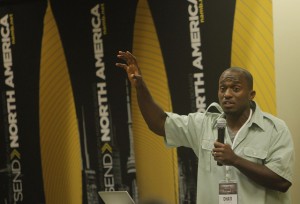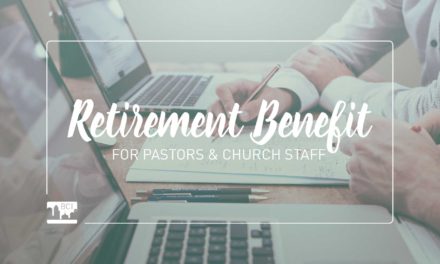By Joni B. Hannigan
RIDGECREST N.C. – Dhati Lewis wants to remind pastors and church planters that a call to the pastorate is not merely a call to preach.
Fresh from leading a workshop at the Black Church Leadership and Family Conference at Ridgecrest Conference Center July 21-26, Lewis said he wants pastors to understand their role is more than preaching, and that church planting and discipleship are two sides of the same coin.
“Discipleship needs to be at the heart of church planting,” said Lewis, director of the Send North America Rebuild Initiative. “I wasn’t called as a pastor so I could preach. I was called as a pastor so I could make disciples.”

Send North America urban church planter Dhati Lewis challenged pastors attending the Black Church Leadership and Family Conference at Ridgecrest Conference Center in July to remember their roles include more than preaching. Their leadership role includes stewardship of church planting and discipleship—two sides of the same coin, according to Lewis.
NAMB photo by Susan Whitley
Discipleship is holistic
Discipleship is more than one-on-one mentoring, Lewis said, and involves a “holistic” approach to capturing the culture and creating a unique environment.
Preaching can be used as a platform, but putting a lot of pressure on something reduced to a 35-minute time slot can take the focus off the task Jesus put forth in Scripture “to make disciples,” Lewis said.
Young African American pastors attending the event produced by LifeWay Christian Resources were excited about planting churches in urban areas, Lewis said.
Other North American Mission Board (NAMB) staff who led workshops included Gary Frost, vice president, Midwest Region and Prayer and Jeff Christopherson, vice president, Northeast and Canada Regions. Frost led sessions on urban revival and awakening and Christopherson presented Kingdom Matrix.
Frost, experienced in leading congregations in the urban core, agrees with Lewis’ assessment of discipleship as more than just on-on-one mentoring, or what Frost further described as “intellectual engagement.”
“We need churches that can engage the school systems, provide sports mentoring and drama, and physical education and art,” Frost said, noting that many public schools have dropped what they consider non-essentials.
“We can step up and step in and we can’t preach the gospel [at schools], but we can go and be the light,” Frost said. “We need churches in the city that will engage the jails and the medical system to bring light.”
Frost said many people have been turned off from going to church by negative personal encounters and so “living out Christ” in the presence of the community is key to church planting.
“We want to plant churches in the urban core that have in their DNA community involvement so that it’s not just something they do on the side, but it’s who they are—without losing their Christ-anchor. That’s true salt and light,” Frost said.
The urban church misunderstood
Lewis, pastor of the urban Blueprint Church launched in downtown Atlanta in 2010, said he is concerned urban is often misunderstood to mean “inner city.”
“Urban does not mean inner city,” Lewis said, quoting statistics he said indicate more than 50 percent of the world’s population–including professionals, young families and people of all ethnic and culture groups—now live in urban areas.
He defines urban as the places where density and diversity thrive in the cities.
“We have to realize what is going on with globalization and secularization,” he said, and in an effort to make disciples, the pastor and church members look around to see who their “neighbors” next door are.
People relocating from the city to the suburb have created “a huge shift that impacts everyone,” and there are no longer neighborhoods where all the “people look like me and talk like me,” for example, he said.
The implications for the church are staggering, Lewis predicted.
“If the church is going to be relevant in North America, we have to go from an ethnic missiology to a neighbor missiology,” he said. “There will be no majority culture.”
If Southern Baptist churches plant congregations in major urban centers—where much of the density and diversity is occurring rapidly—as the cities evolve and adapt, they will become models of how local churches can stay relevant for the future, Lewis believes.
And as globalization rapidly increases, “We get a picture of how America will be; versus our preferences and our likes,” he said.
Citing a recent mission trip to Honduras where a team ministered among the Miskito Indians, Lewis said the Miskito’s first language was original to its people, its second language was Spanish, and its third language was hip hop.
“Here you have those people who don’t even speak English, rapping,” he laughed. “Globalization is already happening.”
No doubt social media and the Internet have increased the means by which globalization has occurred, Lewis said, but the diversity of the urban centers are merely reflected in the common space shared through such phenomena.
None of that, however, can take the place of human relationships.
“People are craving human touch and human relationships,” Lewis said. “That is where the disconnect is and that’s where the Church can make a difference–and that’s a critical component.”
Prayers for spiritual awakening
During the conference, Frost brought greetings at a NAMB-sponsored dinner for ministers and their wives and introduced a variety of leaders, including K. Marshall Williams Sr., president of the National African American Fellowship of the Southern Baptist Convention.
Williams, also pastor of Nazarene Baptist Church in Philadelphia, Penn., said afterwards that he was praying for a spiritual awakening that will bring “repentance for the sinner and revival for the saints.”
Stating his desire for church planting in the form of a prayer, Williams said: “We also pray that as we disciple or teach new believers how to walk with God, it will not only revive our churches but raise up New Testament churches not only in the urban community but everywhere in our nation.”
BLVD Conference—NAMB’s first gathering for and about the urban church—takes place October 23-25. For more information visit rebuildnetwork.org/blvd.
Joni B. Hannigan, a freelance writer in Houston, writes for the North American Mission Board.







